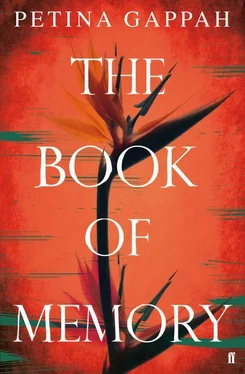‘Every day with Jesus,’ we sang, ‘is sweeter than the day before. Every day with Jesus I love him more and more.’
Then he looked out at the congregation and picked out people. ‘I can see into your heart,’ Reverend Bergen said to a man in a green jacket. ‘What you desire will bring you no lasting joy.’
The man nodded and sat down. Reverend Bergen fixed his colourless eyes on my mother. ‘Stand up,’ he said.
My mother looked around; we looked around, unsure to whom he talked.
‘I am talking to the woman in the blue hat with the white flower,’ Reverend Bergen said, and looked at my mother in her blue hat. She had bought it just the previous week from Amato Stores. ‘I am talking to the woman in the blue hat,’ Reverend Bergen said again.
My mother stood up, in the way that the man in the green jacket had stood up.
‘I see your suffering,’ he said. ‘God sees your suffering. He has all the answers. If you trust in him, he will deliver you. He says to you, in one month, I will end your greatest trouble. Believe in me and I will deliver you.’
He moved on to others, giving each his fatidic pronouncements.
In the line afterwards, my mother could not keep her eyes off Reverend Bergen. He sat at a long table filled with Bibles and copies of a book that he had written called The Spirit Descends. It was more expensive than the Bibles. He signed a book for my mother, and also a Bible, as if he had also written it.
When we went home, she took down the Bible and stroked the page with his autograph. The night before they handed me to Lloyd, I sneaked into the sitting room and took down the Bible from where my mother kept it on the radiogram. I ripped out the page with Reverend Bergen’s sprawling autograph on it and put it in my underpants, and only removed it when I lay down to sleep in my new bedroom in Summer Madness, Lloyd’s house in Umwinsidale
I don’t know whether my mother ever left that church. She was still there when Mobhi died, and the church people came to our house. And she was there still when, in fulfilment of God’s promise that he would relieve my mother of her suffering, they sold me to Lloyd. The vague words spoken by Reverend Bergen gave my mother pride. Her suffering had been given official sanction and confirmation; it had been acknowledged not just by God, but also by God speaking through the undoubted authority of a white man.
Reverend Bergen himself had come — all the way from Germany, he had come; from all that way he had seen how much I suffer, she said. In her telling of the story, the good Reverend had come for no other purpose than to see and tell to the world the nature of my mother’s suffering.
When Lloyd approached my parents a short few months after this, when another white man presented himself to her, she had no hesitation in believing him the messenger sent to deliver her from me.

They happened a lifetime ago, these things that I am telling you about. It is hard for the truth to emerge shining clearly from a twenty-year fog of distant memory. There is a lot to sift through. I am not sure if there was one event that prompted my parents to act as they did, whether my parents sold me to Lloyd because of the church service that Reverend Bergen had led, or whether it was because of the visit to the traditional healer. Or perhaps it was because of both.
It was certainly after that service at Reverend Bergen’s church that my sister Mobhi died. It was during term time that we saw him because it was the Sunday of the week in which Nhau had attacked me because I had beaten him again in a mental arithmetic test.
Mobhi died the afternoon that I saw Nhau steal the peaches from MaiNever’s house. It must have been during the August school holiday because we had spent the whole day playing outside, and it was a day when we would normally have been in school. During the week that Mobhi died, my mother suffered frequent attacks from her headaches, and spent most of her time lying down on her bed. For that reason, we mainly played outside.
I sat in the shade with my father, watching him make a little wire aeroplane, and when it was finished, moving it up and down on the same spot. Mobhi slept on a blanket near where my father worked, and when she got up, she wandered off to play with Promise from next door. Joyi was, as always, playing in the street.
Not even the death of Sheila, the little girl from up the street who had been crushed by a car the Christmas before, stopped the children from playing outside. The street was the only place there was, and that August was no different. I could hear Joyi’s voice joined to those of the other children playing endless rounds of dunhu, rakaraka and chisveru. When I asked my father if I could play with the others, he said it was too hot, and I should sit in the shade at the side of the house and help him with his cars.
Around two in the afternoon, Joyi came back home, complaining that she was hungry. My father said, ‘Don’t disturb your mother — she is sleeping.’
When Joyi said again that she was hungry, my father said, ‘Fine, we will get something from the shops.’ She cheered up at once.
My father called out to Mobhi to come, but she cried that she wanted to stay next door. I knew why she wanted to stay: MaiPrincess’s daughter Promise had a new doll with curly yellow hair and blue, long-lashed eyes that opened and closed while it said ‘Mama’. That holiday, Mobhi had spent as much time as she could with Promise, watching her play with her doll, never allowed to touch it, only clapping, cheering and giving little jumps when the doll said ‘Mama’ and Promise hugged it to herself.
While my father was trying to persuade Mobhi, I managed to sneak into the house without waking my mother. I fetched my hat from our room. When my father saw me put my hat on, he said, ‘Memo, you stay here with Mobhi, and make sure she does not disturb your mother. I will bring you back some food.’
My father said to me that Mobhi could stay next door, as long as she did not go back into the house to disturb our mother. I stood near the fence and watched Mobhi and Promise play. They made the doll open and close her eyes again and again. I was angry and resentful. I wanted to go to the shops, and had a good mind to follow my father and Joyi. After a few minutes, tired of watching a game I did not have a part in, I wandered away from the fence and went to sit on our veranda, where I could watch the people passing in the street.
It was then that I saw Nhau. He was walking strangely, like he had something in his pants and shorts. Then I saw what it was: he had hidden peaches in his clothes. I realised that he could only be coming from MaiNever’s house. She had a mulberry bush and a peach tree; Lameck sold the peaches for her. Nhau could only have got them from there.
As I watched him walk away from the house, three peaches fell out without his noticing. There was no one to see him disappear up the street. The peaches lay there, unnoticed, inviting. No one would see me if I took them.
I left the veranda and went over to pick them up. I rubbed one on my dress. Just as I was about to bite into it, MaiNever came and saw me with the three peaches in my hands. ‘You are the thief who has been taking our peaches!’ she shouted.
I protested that it was not I, that all I had done was to see them fall and pick them up. ‘Fall from where?’ she asked. ‘Don’t tell lies, how can peaches fall from the tree behind my house, how can they just fall onto the street?’
‘They are not your peaches,’ I said.
Читать дальше













